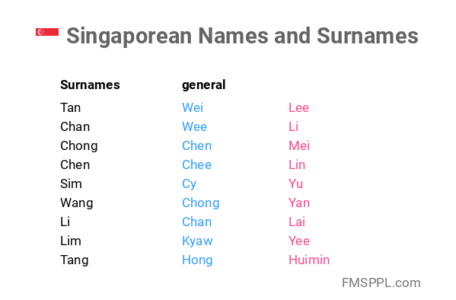From cultural roots to global trends, why Singaporean names are blending tradition with modernity.
SINGAPORE: In 2019, I encountered an American customs agent who struggled to grasp the structure of my full name: Kimberly Anne Lim Lu-Jin. His confusion highlighted how unfamiliar the naming conventions of Chinese Singaporeans might seem outside of the country.
In Singapore, the English-name-Chinese-surname-Chinese-name format is common, especially among the local Chinese community. Those raised Catholic might also have an added middle name. For many, this blend of cultural and modern influences reflects both heritage and global aspirations.
Naming Trends in Singapore
The shift toward English names isn’t new. Dr. Peter Tan, a senior lecturer at the National University of Singapore, observed this phenomenon over two decades ago in his research. According to Dr. Tan, English names gained popularity in the 1990s, influenced by global trends, rising English literacy, and the preference for speaking English at home.
Over time, Chinese names have often fallen into disuse, eclipsed by English monikers. Today, classrooms are filled with Sophias and Jaydens rather than Hui Lings or Boon Hengs. This trend is not limited to Chinese Singaporeans—local Malays have also adopted culturally ambiguous names like Adam and Sarah, bridging tradition and modernity.
Names as Ice-Breakers
For some, having a unique name serves as a conversation starter. Solskjaer Thio, for example, carries the legacy of his parents’ admiration for football star Ole Gunnar Solskjaer. His name often sparks curiosity about his background, blending individuality with cultural roots.
Others, like Lim Zhi Xuan, have chosen to adopt English names for practicality. Now known as Shane, he found that an English name helps build rapport in professional settings while his Chinese name retains personal significance.
Auspicious Naming Practices
Even with the rise of English names, the Chinese tradition of consulting feng shui masters for auspicious names persists. Master Kevin Foong, who expanded his naming services to include English names, combines Chinese metaphysics with Western astrology to craft names aligned with clients’ life paths.
According to Master Kevin, names—whether Chinese or English—hold power to influence health, relationships, and success. This approach has attracted clients seeking names that resonate across cultures and enhance personal fortunes.
Balancing Identity
As Singaporeans embrace English names, some worry about losing cultural heritage. Dr. Tan, however, views this evolution as a redefinition of identity. “We aren’t losing anything—we’re choosing new ways to express our heritage,” he explains.
For some, language or traditional practices may hold greater significance than names. For others, a unique name—like Solskjaer—is an equally valid expression of cultural identity.
Ultimately, Singaporean names, whether traditional or modern, share one defining characteristic: they often leave foreigners at customs scratching their heads.








